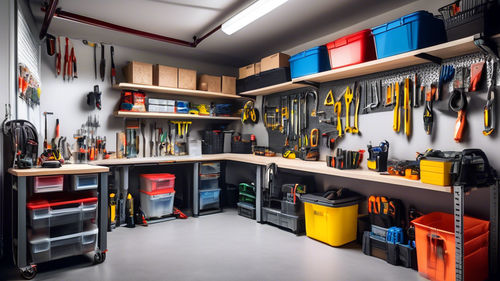
Father's Hoarding Crisis: Services for Cleanup
Share
When a loved one, like a father, is struggling with a hoarding crisis, a holistic approach is essential. This involves understanding that hoarding is a mental health disorder rooted in emotional and psychological factors. Professional cleanup services, such as those provided by trained organizers and cleaning specialists, can help restore a safe environment. These services address the physical clutter while also providing support for the individual's emotional well-being. A multidisciplinary team, including mental health experts, can help develop healthier coping mechanisms and strategies for managing possessions. By taking the first step towards addressing the crisis, you can uncover a path towards a more peaceful and organized living space.
Key Takeaways
• A thorough hoarding intervention involves a multidisciplinary team addressing underlying causes and developing healthier coping mechanisms for managing possessions.
• Professional organizers, trained to work with hoarding disorder, provide sensitive and efficient cleanup services, reducing stress and promoting a safe environment.
• Clutter removal services utilize specialized teams for quick removal, allowing individuals to regain control over their living space and improve overall well-being.
• Hoarding therapy, such as cognitive-behavioral therapy, fosters long-term behavior change and reduces relapse risk, addressing the emotional and psychological roots of hoarding disorder.
• Restoring a safe environment is crucial in the recovery process, requiring a holistic approach that combines therapy, professional organizers' guidance, and organizing strategies for a functional and peaceful living space.
Understanding Hoarding Disorder
Hoarders, often misunderstood and stigmatized, are individuals who struggle with a mental health disorder characterized by an excessive accumulation of possessions and difficulty discarding items, regardless of their actual value or usefulness. This complex issue is rooted in emotional and psychological factors, making it essential to approach the situation with empathy and understanding.
A thorough hoarding intervention involves a multidisciplinary team of professionals, including mental health experts, organizers, and cleaning specialists. Effective mental health support is vital in addressing the underlying causes of hoarding behavior, enabling individuals to develop healthier coping mechanisms and strategies for managing their possessions.
Cleanup Services and Support
Once the underlying emotional and psychological factors contributing to hoarding behavior have been addressed, the physical task of cleaning and organizing the living space can begin, requiring a tailored approach that incorporates sensitive and efficient cleanup services and support. This support can come in the form of professional organizers, clutter removal services, and hoarding therapy. It's essential to work with professionals who understand the complexities of hoarding disorder and can provide guidance and support throughout the cleanup process.
| Service | Description | Benefits |
|---|---|---|
| Professional Organizers | Trained to work with individuals with hoarding disorder, providing guidance and support | Sensitive and efficient cleanup, customized approach |
| Clutter Removal Services | Specialized teams to remove unwanted items, dispose of trash, and organize remaining items | Quick and efficient removal, reduced stress |
| Hoarding Therapy | Cognitive-behavioral therapy to address underlying emotional and psychological factors | Long-term behavior change, reduced relapse risk |
These services can provide the necessary support and guidance to help individuals with hoarding disorder overcome their struggles and maintain a clutter-free living space.
Restoring a Safe Environment
By addressing the physical and emotional toll of hoarding, restoring a safe environment becomes a crucial step in the recovery process, enabling individuals to regain control over their living space and improve their overall well-being.
This involves more than just cleaning up clutter; it requires a holistic approach that addresses the underlying issues driving the hoarding behavior. Hoarding interventions, such as cognitive-behavioral therapy, can help individuals understand and change their thought patterns and behaviors.
Professional organizers can also provide valuable guidance on organizing and decluttering strategies, helping individuals create a more functional and peaceful living space. By working together, individuals can break free from the grip of hoarding and restore a safe, healthy environment that supports their overall well-being.
Frequently Asked Questions
How Can I Stage an Intervention for My Father's Hoarding Without Offending Him?
When staging an intervention, prioritize Family Dynamics and adopt a Gentle Approach to avoid offending your father. Empathetically acknowledge his struggles, and involve trusted family members or a professional organizer to facilitate a supportive, non-judgmental conversation.
Are There Any Local Organizations That Provide Free or Low-Cost Cleanup Services?
"Explore local Community Outreach programs and Government Assistance options that offer free or low-cost cleanup services, often in partnership with non-profits, to support individuals in need of clutter removal and organization."
Can I Deduct the Cost of Cleanup Services From My Father's Taxes?
When considering tax exemption, individuals may deduct costs related to improving a dwelling's accessibility or safety, alleviating a financial burden. Consult a tax professional to determine if cleanup services qualify as a legitimate medical expense deduction.
How Do I Handle Sentimental Items During the Cleaning Process With My Father?
When downsizing, sentimental items can evoke strong emotional attachment. Set boundaries by designating a "maybe" box, allowing individuals to revisit items later, and consider enlisting a neutral third-party mediator to facilitate decision-making.
What Are Some Strategies for Maintaining a Clutter-Free Space After the Cleanup?
To maintain a clutter-free space, identify and address Clutter Triggers, implement effective Space Management strategies, and establish habits such as regular tidying, categorizing, and intentional purchasing to prevent clutter accumulation.
Conclusion
Hoarding disorder is a complex issue that affects not only the individual but also their loved ones. Cleanup services specializing in hoarding cases can provide invaluable assistance in restoring a sense of order and tranquility to the home.
By addressing the physical clutter and underlying emotional and psychological factors, these services can facilitate recovery and healing. One potential objection to seeking help is the perceived invasion of privacy; however, professional cleanup services prioritize empathy and discretion, ensuring a safe and non-judgmental environment for all parties involved.
Related Posts
-

Garage Organization Tips for Overcrowded Spaces
Decluttering and Maximizing Space If your garage has become an unmanageable clutter zone, it's time to reclaim you...
-

10 Essential Online Closet Organization Tips for Beginners
You're about to organize your closet like a pro! Start by setting up a virtual closet using an app or spreadsheet to ...
-

Clear Digital Clutter for a Peaceful Mind
You're tired of feeling anxious and mentally fatigued, but do you know that your cluttered digital space is a major c...


